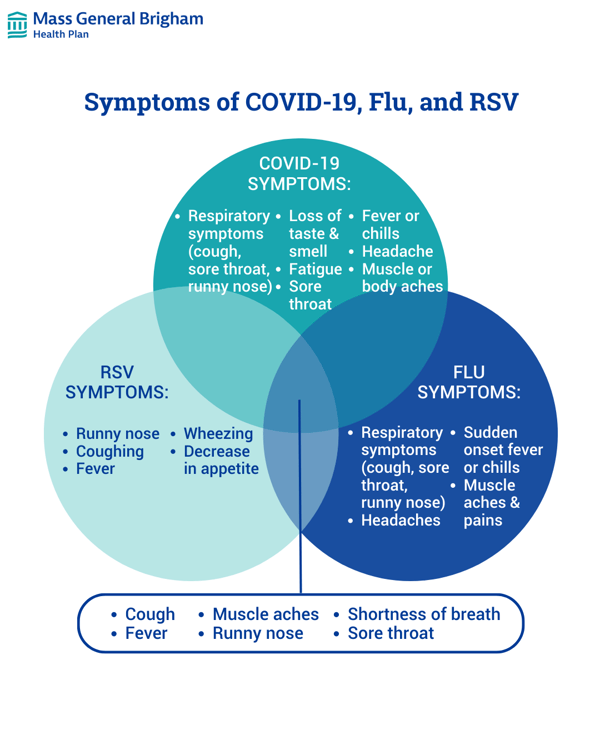How to protect yourself from the Flu, RSV, and Covid-19 this winter
With colder weather driving people indoors there is increased exposure with decreased immune responsiveness. Subsequently, during this winter season, hospitals are experiencing high cases of RSV, flu, and even COVID-19. While all three viruses are present, some have referred to this as a “Tripledemic.” While the Flu, COVID-19, and RSV are all respiratory viruses, there are some differences in how they spread. Continue reading to learn more.
RSV
RSV is a common and highly contagious respiratory virus that is spread primarily though droplets and causes cold-like symptoms in young children. Due to all the COVID-19 precautions, many young children haven’t been exposed to the virus in the last few years, but now with restrictions lifted, many are being infected. While children under the age of two are most likely to contract RSV, it has been reported that more adults over the age of 65 have been contracting the virus. RSV is especially dangerous for younger children it can lead to breathing difficulties because their lungs aren’t fully developed. While there is currently no vaccine for RSV, babies born prematurely or with an underlying medical condition may qualify for RSV antibody injections to help prevent severe disease.
Flu
Flu infections are significantly higher than in the past two winter seasons additionally due to the lifted COVID-19 precautions. With this season’s flu outbreak being the worst in a decade, the CDC reports that there has been at least 15 million flu illnesses so far. The flu can spread from respiratory droplets, aerosols and though contaminated surfaces. Vaccines to protect against influenza are tailored each season, based on the prior season’s flu strains, to minimize risks of infections, complications, hospitalizations, and flu-related deaths.
Covid-19
COVID-19 spreads when an infected person breathes out droplets and then breathed in by other people or land on their eyes, nose, or mouth. People who are most likely to get very sick from COVID-19 are older adults, people who are unvaccinated, and people with certain medical conditions. The newest Covid-19 variant XBB.1.5. (a descendent of Omicron) is quickly spreading in the U.S. and has been described as the most transmissible form of the virus yet. Compared to the flu, COVID-19 may take longer to show symptoms and be contagious for longer periods of time. Anyone infected with COVID-19 can spread it, even if they do not show symptoms. It is a good idea to test for COVID-19, but even if the test is negative, keep in mind that it will not rule out RSV or other infections.
Experts warn that the simultaneous presence of RSV, flu and Covid-19 could become the normal during winters for years to come. Vaccines, testing, antiviral treatments, and everyday hygiene measures remain the best tools to slow transmission of the viruses and limit the severity of infections. Since RSV, flu and Covid-19 are all respiratory viruses, they are difficult to distinguish when symptoms start. All of those viruses carry similar symptoms.
 Here are ways that you can reduce your risk of getting sick and help prevent spreading the viruses:
Here are ways that you can reduce your risk of getting sick and help prevent spreading the viruses:
- Stay up-to-date with your vaccines for COVID-19 and flu
- Wash your hands often with soap and water
- Cover your mouth when sneezing or coughing
- Clean and disinfect surfaces
- Consider wearing a mask
- Be cautious when gathering with young children and elderly people
- Stay home if you feel sick
It is not too late to get the COVID-19, flu or other vaccinations. Remember, if you’re vaccinated, you not only increase your own protection but also reduce the risk for those around you. To find a COVID vaccine location near you, visit one of the following sites:
You can also find an updated COVID vaccine location by texting your zip code to 438829 or calling 1-800-232-0233.
Mass General Brigham offers the updated booster vaccine at many primary care offices and some specialty offices during regularly scheduled office visits. We are also hosting several clinics that offer both flu and updated COVID-19 booster vaccines throughout the fall. Check our website to see which clinics have both the flu shot and the updated COVID-19 booster.
Mass General Brigham will also continue to distribute vaccines from our mobile community vans. Check the schedule to see if the vans will be near you.
Note: Information in this article was accurate at the time of original publication. Because information about COVID-19 changes rapidly, we encourage you to visit the websites of the Centers for Disease Control & Prevention (CDC), World Health Organization (WHO), and your state and local government for the latest information.
For more health and wellness education from Mass General Brigham Health Plan, follow us on social @MGBHealthPlan
⬇️




